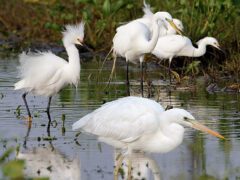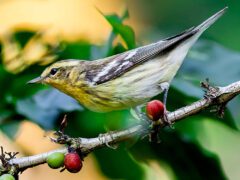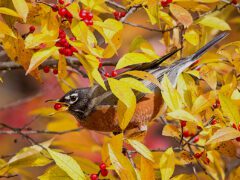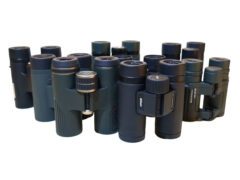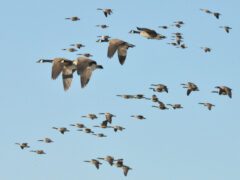The Four Keys to ID
- Size & Shape
A heavyset chickenlike bird with a short bill, short, strong legs, and a medium-length tail that can be fanned into a semicircle.
Relative Size
Larger than a Spruce Grouse, smaller than a Wild Turkey.

 between crow and goose
between crow and gooseMeasurements
- Both Sexes
- Length: 17.3-22.4 in (44-57 cm)
- Weight: 40.9-45.2 oz (1158-1281 g)
- Wingspan: 25.6-26.4 in (65-67 cm)
© Jackson Trappett / Macaulay Library
- Color Pattern
Both male and female are mottled in camouflage patterns of brown, gray, white, and black. Males have dark gray tails and blue-gray underparts. In display, males reveal purplish-red air sacs on the neck, and their eye combs swell and become a rich yellow or red.
© Andrew Spencer / Macaulay Library - Behavior
Dusky Grouse spend much of the day resting and feeding. They forage on the ground for plants and insects, as well as in trees where they take leaves, needles, and buds, especially in winter. Males display in early spring from perches in trees or near the ground, making short flights and performing strutting displays on the ground.
- Habitat
Montane forests (hemlock, ponderosa pine, fir, Douglas-fir) and adjacent open areas of bunchgrass, sagebrush, and subalpine habitats.
© Emma Rosen / Macaulay Library
Regional Differences
Four named subspecies differ mostly in markings on the tail, scapulars, and wing coverts. The southern subspecies (obscurus and oreinus) have a gray band at the end of the tail, which is essentially absent in the northern subspecies (richardsonii, pallidus).














